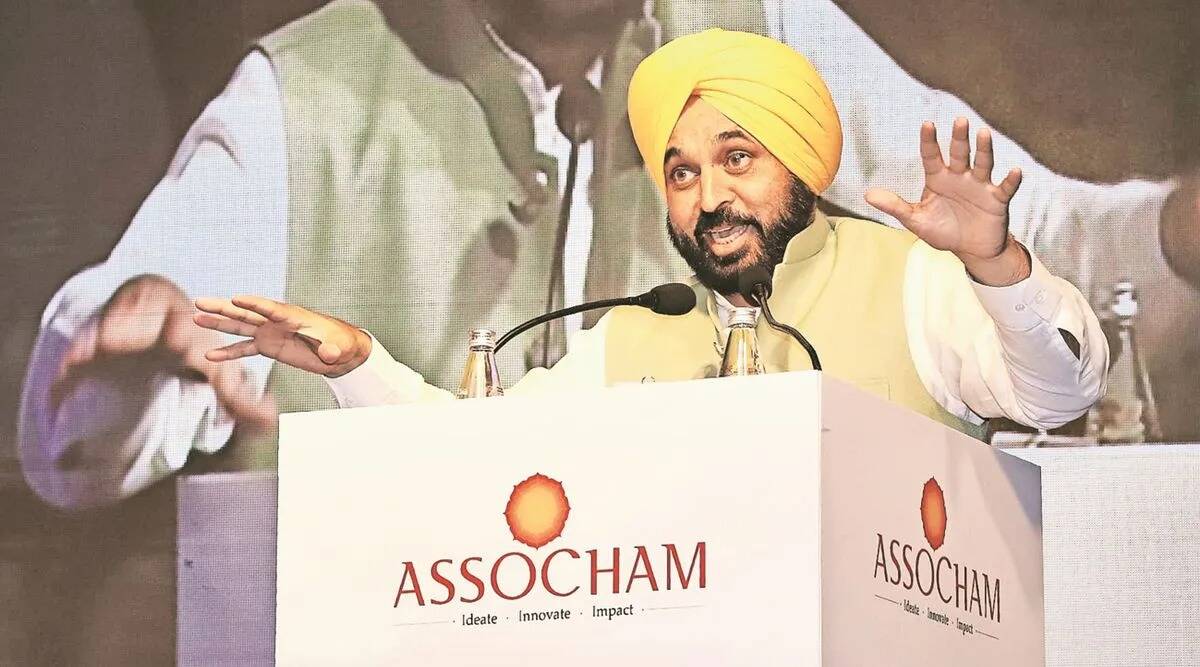 Punjab CM Bhagwant Mann (File)
Punjab CM Bhagwant Mann (File)With Opposition parties raising questions over non-fulfilment of its pre-poll promises, especially ahead of the high-stake Assembly elections in Gujarat and Himachal Pradesh, the ruling Aam Aadmi Party in Punjab has decided to formulate a new policy to absorb 35,000 contractual employees, who have completed 10 years in service, as workforce under a separate cadre.
The move by the Bhagwant Mann-led government to fulfil AAP’s key pre-poll guarantee, comes as several proposed legislations in the past failed to get the assent from the Raj Bhawan. By notifying a policy, the government would be able to bypass the legislation route. It would also help it circumvent the Supreme Court’s direction in Uma Devi vs State of Karnataka judgment that has been coming in the way of providing relief to the contractual employees.
If the policy is approved by legal experts, the government will table it in the next Cabinet meeting. After Cabinet nod, the policy would be notified and the contractual employees, who have completed 10 years of service, will be absorbed immediately.
“We will notify the policy as soon as it gets a nod from the legal experts and the Cabinet clears it. We do not want to go wrong. That is why the Chief Minister Bhagwant Mann is urging the contractual employees to give him time as he has the intent to regularise them. He is just finding a way,” a government functionary privy to the developments said.
Subscriber Only Stories
The AAP wants to showcase the fulfilment of its pre-poll promises in Punjab to the electorate in states going to
polls.
Earlier, the government was mulling of bringing a Bill in the budget session, as it had already set aside Rs 450 crore for fulfilling the key pre-poll promise. However, it could not prepare a draft legislation that could stand legal scrutiny.
CM Mann and AAP national convenor Arvind Kejriwal had even reprimanded some senior officials who were tasked with preparing the proposed legislation. The CM later announced a Cabinet Sub-Committee, headed by Finance Minister Harpal Singh Cheema, to find a way for the government to fulfil its promise.
“We have studied the Uma Devi case verdict. A lot has happened since then. There is a way to circumvent the directive. We will do that. This would directly help those employees who have served the government for 10 years. The neighbouring Himachal Pradesh has regularised contractual employees who had served for three years only. So we are bringing a policy in this regard that will stand legal scrutiny. Only the Cabinet will give its nod to the policy,” said the functionary, highlighting how the move will circumvent the Raj Bhawan.
In the State of Karnataka and Others vs Uma Devi and Others (2006) verdict, a five-judge Constitution Bench of the Supreme Court dealt with the question of irregular (not illegal) employment, and ruled that daily wage/temporary/contractual employees had no inherent right to be absorbed in service. However, the court gave a one-time relaxation to governments to frame a policy for regularisation of “duly qualified persons in duly sanctioned vacant posts (who)… have continued to work for 10 years or more”.
The government functionary quoted above said, “We have a relationship between the employees and the employer
(government). We can easily absorb them. However, this cannot be done in case of outsourced employees”.
The functionary said that they were confident that the policy would stand legal scrutinty. “Have we not given power subsidy to farmers as a part of policy? We did not bring any legislation. Why is the legislation needed? If the government wants to onboard these employees as a separate cadre, what is the harm? We are not flouting the direction in Uma Devi case, which says that the employees once hired on contract cannot be regularised. They will be a separate cadre now”.
Mann had on March 22 announced to regularise services of 35,000 contractual employees of group C and D. His predecessor Charanjit Singh Channi too had decided to regularise around 36,000 employees working on contractual, ad hoc or temporary basis. The Channi-led Congress government had on November 11, 2021 passed the Punjab Protection and Regularisation of Contractual Employees Bill. However, the Governor returned the Bill raising six questions, including how the Bill could withstand the scrutiny of the law in light of the 2006 verdict (Uma Devi case).
The financial implications, if the AAP’s promise is implemented, will be Rs 827.87 crore for regularising employees in government departments and Rs 974 crore for boards and corporations.
The Governor had earlier asked as to how the government, already facing a fund-crunch, plans to meet the expenditure. He also sought clarity on how many more employees covered under Section 4 of the Bill, who have not completed 10 years of service, will be regularized after completion of 10 years of service, and if so, what would be the estimated financial implication. Can such employees be regularized without being in contravention with the decisions of the Supreme Court, he had asked.
Channi had accused the Governor of playing politics then. The government had later taken a legal advice and attempted to answer all these questions.
Prior to that, the SAD-BJP government too had brought a similar Bill in 2016 but it could not stand legal scrutiny.